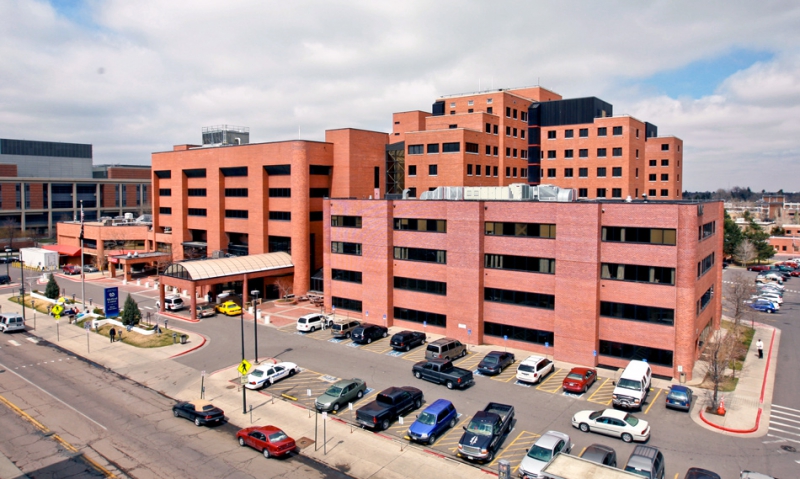
Legionnaires among 200 veterans, supporters who gather to encourage Congress to fund completion of the troubled Aurora, Colo., VA project.
Finish the damn thing.
That was the rallying cry of some 200 veterans and supporters who gathered near the still-unfinished VA medical center campus in Aurora, Colo., Sunday to encourage Congress to fund completion of the troubled project. They said abandoning the replacement for the outdated and overwhelmed Denver VA hospital, now more than $1 billion over budget and years behind schedule, will punish veterans instead of the bureaucrats who are responsible for the Denver debacle.
“It’s not the veteran’s fault this was mismanaged,” said Leanne Wheeler, an Air Force veteran and chairman of the Colorado Veteran Advisory Group. “It would be a big blow to our health care and well-being if it doesn’t get built.”
“Not completing this would be a national disgrace,” said Ralph Bozella, chairman of The American Legion’s Veteran’s Affairs & Rehabilitation Commission and immediate past president of United Veterans of Colorado. United Veterans of Colorado, a coalition of 50 veterans service organizations that represent 450,000 members, sponsored Sunday’s rally.
The future of the partially finished replacement hospital has been in question for more than a year as cost overruns and construction delays have exhausted Congress’ patience. Congress approved stop-gap funding in late May while it considers its options. The outlook is grim, considering the chairmen of the House and Senate Veterans' Affairs Committees are calling the Denver replacement hospital the largest construction failure in history.
“Because of a near complete and total lack of focus on the project at the highest levels of VA and the department’s disregard for congressional oversight, the future of the Denver replacement hospital is unclear,” U.S. Rep. Jeff Miller, R-Fla., and U.S. Sen Johnny Isakson, R-Ga., said in statement issued on May 14. “VA has essentially demanded that taxpayers subsidize the department’s incompetence with an $830 million bailout.”
Veterans and supporters are mounting a national campaign to persuade Congress to appropriate funds to finish the hospital as soon as possible. The need is critical. There are an estimated 1 million veterans in Colorado, Wyoming, Kansas, New Mexico, Montana and Utah who would benefit from the regional medical center and the number is growing.
“Here in Colorado Springs, we separate 500 to 700 active-duty military each month,” Wheeler said. “We are insisting they register with the VA, but we don’t have capacity to address their needs. That’s ridiculous.”
The current Denver VA Medical Center was completed in 1951. It has been overcrowded for years, and maintenance costs are high. In 2004, the Capital Assess Realignment and Enhanced Services Commission made replacing the Denver hospital a top VA priority.
VA ran into trouble almost from the moment it agreed to build a new 182-bed hospital and spinal-cord injury center at the former Fitzsimmons Army Medical Center site. The original $328 million price tag ballooned to more than $600 million by the time construction finally started in 2012. Estimates now top $1.7 billion; a completion date remains in question. Even supporters agree its mind boggling. “I personally got involved in this effort in 2001,” Bozella said. “Since then, there have been two two-term presidents, five VA secretaries and eight Congresses, and it’s still not done.”
Support for the new VA medical center remains high despite the problems. Sunday’s rally included U.S. Reps. Mike Coffman, R-Colo., and Earl Perlmutter, D-Colo., a half dozen state legislators and other officials, said Frank McCurdy, American Legion National Executive Committeeman for Colorado and president-elect of United Veterans of Colorado. The Colorado Legislature also unanimously passed a resolution calling on Congress to fund completion of the hospital in April.
“Deputy VA Secretary Sloan Gibson came here in December and took responsibility,” McCurdy added. Meanwhile, mothballing and restarting construction of the fraught construction project at a later date would cost taxpayers an estimated $200 million.
In a recent memo to VA Secretary Robert McDonald, Miller outlined five conditions for continuing to fund the new Denver hospital, including detailing disciplinary actions taken against the VA officials responsible for the problems, a comprehensive cost estimate and a firm completion date. Veterans are waiting.
“America can afford to do this for its veterans,” Bozella said. “America needs its veterans.”
- Veterans Healthcare

